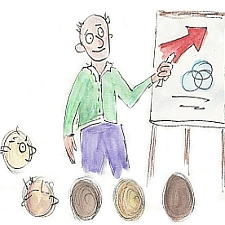 When I trained as a coach and was working towards certification, over a decade ago, a lively topic of conversation amongst some of my fellow learners was ATPCTCWDHAC (all those people calling themselves coaches who don’t have a clue). “Anybody who has a life thinks they can be a life coach,” we moaned. “Everyone without a job sets up as a business coach,” we wailed.
When I trained as a coach and was working towards certification, over a decade ago, a lively topic of conversation amongst some of my fellow learners was ATPCTCWDHAC (all those people calling themselves coaches who don’t have a clue). “Anybody who has a life thinks they can be a life coach,” we moaned. “Everyone without a job sets up as a business coach,” we wailed.
As someone who had a life but didn’t have a work permit, to some degree, I fit the profile of the clueless imposter. Still, to me, it seemed that coaching without training was a bit like driving without knowing the rules of the road – possible, but a really bad idea.
It’s true that anyone can call themselves a coach. There’s no requirement to be trained or certified. Some untrained people are fine coaches, just as some with training can be ineffective. No amount of instruction guarantees good performance and no certification can replace experience, empathy and effective communication. On the other hand, no amount of passion, interpersonal skill or drive can replace sound knowledge and time-tested approaches to coaching conversations. Coaching needs a foundation.
AGILITY + FLUENCY
Today, I train coaches, using the learning objectives and proficiencies of two certifying organizations. My participants are workplace coaches, helping to introduce new ideas, mindsets and collaborative ways of working. Their job is to introduce and help people adjust to change – the thing the human brain seems to resist the most. They wear many hats: leader, trainer, facilitator, mentor, teacher, advocate and coach to teams and individuals. Their job title is “agile coach.”
When I first heard about these people, suspicions of ATPCTCWDHAC invaded my brain. “These people call themselves coaches,” I thought. “Are they legit?” Then I met some. They’re smart, curious, committed, creative and passionate about building a workplace where humans thrive doing quality work. They’ve signed on for work that puts “individuals and interactions over processes and tools.” (Agile Manifesto) Awesome! I had found my tribe!
However, in conversations and conference sessions, I discovered that, since they often come from the ranks of engineers, project managers and software developers, by nature, many agilists are more comfortable and confident around ideas, processes and predictable events than they are with the more untidy “individuals and interactions.” And they’re motivated to get better at that messy “people stuff.”
“These people call themselves coaches,” I thought. “Let’s help them to be fantastic coaches.” So I developed the It’s Understood Coach Program to help agile coaches be as confident around the “coach” part of their job as they are around the “agile” part. What we’ve seen is that when they adopt a coach approach and begin to develop fluency in the language of coaching, they become more effective in all parts of the job.
COACHING CONFIDENCE
Through years of associating with, being coached by, teaching and observing coaches – trained and untrained, certified or not, employed in the workplace or independent – I’ve noticed that those who’ve gone through coach training programs are more confident than those who hung up their shingles without formal instruction. Trained coaches are not only more certain of their own abilities, they’re more sure of their clients’ abilities to develop the mindset and actions that will help them set meaningful goals and reach them. And that makes them better coaches.
Dave Buck, a super coach and one of many who trained me, uses the phrase, “My certainty is greater than your doubt.” For me, that idea addresses the need for a coach to have confidence in:
- the coaching process
- the collaborative coaching relationship and
- a client’s willingness to be inspired to take action.
Change is seldom comfortable, yet a coach’s confidence that something is not only possible but likely can make the difference between wishing things were different and doing something to make it so.
Does that confidence come from being exposed to, discussing and practising some fundamental coaching skills? Does it come from having made a commitment to learn? Is it amplified by investing our scarce time and hard-earned coins? Or are people who opt for training more likely to have the personality and mindset required to be a good coach? Who knows? I’m pretty sure it’s not just pure dumb luck.
If you’re an agilist who wants to know more about It’s Understood’s professional coach training for agile coaches, click here. Delivered over 12 weeks via online learning and teleclasses, the program meets the learning objectives for icAgile’s coach certification and is based on the certification standards set by the International Association of Coaching.
